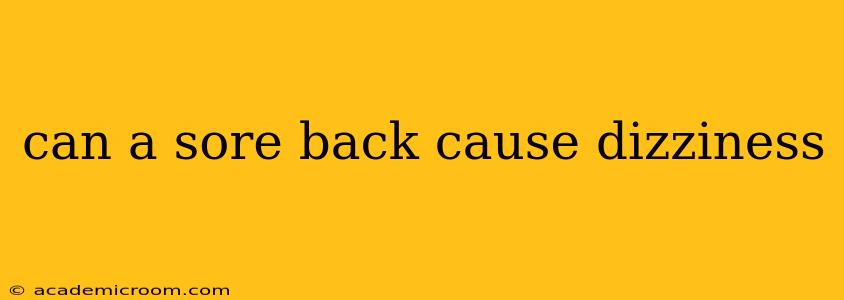A sore back and dizziness might seem like unrelated symptoms, but the connection is more complex than you might think. While not always directly causal, back pain can indeed trigger dizziness in several ways. Understanding this relationship is crucial for effective diagnosis and treatment. This article explores the potential links between back pain and dizziness, answering frequently asked questions and providing valuable insights.
How Can Back Problems Lead to Dizziness?
The intricate network of nerves, blood vessels, and muscles in your back plays a vital role in maintaining balance and overall body function. Issues affecting these structures can indirectly lead to dizziness. Here are some key mechanisms:
-
Muscle Tension and Dehydration: Severe muscle spasms and stiffness in the back can restrict blood flow. This reduced blood flow can, in turn, deprive the brain of oxygen, leading to lightheadedness or dizziness. Dehydration, often associated with intense back pain and limited mobility, exacerbates this issue.
-
Cervicogenic Dizziness: This specific type of dizziness originates from the neck and upper spine. Problems in the cervical spine, such as arthritis, injuries, or muscle strain, can irritate the nerves responsible for balance and spatial orientation, causing dizziness, vertigo, and even nausea.
-
Vertebrobasilar Insufficiency: In rare cases, severe spinal problems can affect the blood vessels supplying the brain stem. This condition, known as vertebrobasilar insufficiency, can lead to severe dizziness, vision problems, and neurological symptoms.
-
Underlying Medical Conditions: Sometimes, back pain and dizziness are symptoms of a larger underlying medical condition. For example, conditions affecting the inner ear, such as Meniere's disease, might manifest with both back pain (due to muscle tension or compensatory posture) and dizziness as primary symptoms.
What Are the Symptoms Associated with Back Pain and Dizziness?
Experiencing both back pain and dizziness warrants careful attention. Alongside the primary symptoms, you might also experience:
- Headaches: Often accompanying neck-related dizziness.
- Nausea and Vomiting: Especially prevalent in cases of severe dizziness or vertebrobasilar insufficiency.
- Visual Disturbances: Blurred vision, double vision, or light sensitivity.
- Balance Problems: Difficulty walking, standing, or maintaining equilibrium.
- Numbness or Tingling: In the arms, legs, or other parts of the body.
Can a Pinched Nerve in the Back Cause Dizziness?
Yes, a pinched nerve in the back, particularly in the neck or upper back, can indeed cause dizziness. The pinched nerve might irritate or compress the nerves responsible for balance and spatial orientation, directly leading to dizziness. This is often associated with other symptoms like neck pain, arm pain, and numbness or tingling in the extremities.
What Should I Do if I Experience Back Pain and Dizziness?
If you're experiencing both back pain and dizziness, it's crucial to seek medical attention. A healthcare professional can accurately diagnose the underlying cause and recommend appropriate treatment. Delaying treatment might worsen the condition or mask a more serious problem. Self-treating can also be harmful and delay proper diagnosis.
When Should I See a Doctor About Back Pain and Dizziness?
Consult a doctor immediately if your dizziness is severe, persistent, or accompanied by other concerning symptoms like:
- Severe headaches
- Vision changes
- Numbness or weakness
- Difficulty speaking or swallowing
- Loss of consciousness
These symptoms could indicate a serious underlying medical condition requiring urgent attention.
How Is Dizziness Caused by Back Pain Diagnosed?
Diagnosing the cause of dizziness associated with back pain requires a thorough evaluation. Your doctor will likely perform a physical examination, review your medical history, and may order additional tests, such as:
- Neurological examination: To assess your reflexes, coordination, and balance.
- Imaging studies (X-rays, MRI, CT scan): To visualize the spine and identify any structural abnormalities.
- Blood tests: To rule out other potential causes.
- Balance tests: To assess the function of your inner ear and vestibular system.
In conclusion, while not always directly connected, back pain and dizziness can share underlying causes. Understanding the possible links, symptoms, and appropriate medical attention is crucial for managing and resolving these issues effectively. Always consult with a healthcare professional for an accurate diagnosis and appropriate treatment plan.
